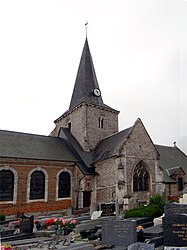Écrainville (French pronunciation: [ekʁɛ̃vil]) is a commune in the Seine-Maritime department in the Normandy region in northern France.
Écrainville | |
|---|---|
 The church in Écrainville | |
| Coordinates: 49°39′09″N 0°19′17″E / 49.6525°N 0.3214°E | |
| Country | France |
| Region | Normandy |
| Department | Seine-Maritime |
| Arrondissement | Le Havre |
| Canton | Saint-Romain-de-Colbosc |
| Intercommunality | CC Campagne de Caux |
| Government | |
| • Mayor (2020–2026) | Claire Gueroult[1] |
| Area 1 | 12.82 km2 (4.95 sq mi) |
| Population (2021)[2] | 969 |
| • Density | 76/km2 (200/sq mi) |
| Time zone | UTC+01:00 (CET) |
| • Summer (DST) | UTC+02:00 (CEST) |
| INSEE/Postal code | 76224 /76110 |
| Elevation | 58–137 m (190–449 ft) (avg. 110 m or 360 ft) |
| 1 French Land Register data, which excludes lakes, ponds, glaciers > 1 km2 (0.386 sq mi or 247 acres) and river estuaries. | |
Geography
editA farming commune made up of 11 villages and hamlets in the Pays de Caux, situated some 13 miles (21 km) northeast of Le Havre, at the junction of the D68 and D139 roads.
History
editThe origin of the name is uncertain, but Escrainvilla is first mentioned at the end of the 12th century. Many documents trace the occupation of the territory at the time of the Franks and even earlier. Abbé Dicquemare described, in 1778, the 150 human skeletons found in the crypt at the former quarry at Maucomble at Val-Miellé, and suggests that the crypt was prior to the 11th century, as the church of Saint-Denis dates from that period.
The first written mention of Écrainville or one of its hamlets dates back in the late 11th century. In 1180, the lord of Tennemare or Tannemare appeared in the records of the Exchequer of Normandy. Until the 17th century, the seigneurie passed from father to son of the Folville family.
A decree of 25 October 1826 joined Tennemare and Écrainville as one commune. In the 19th century the textile industry was still flourishing but declined from the 1920s onward.
Population
edit| Year | Pop. | ±% p.a. |
|---|---|---|
| 1968 | 657 | — |
| 1975 | 683 | +0.56% |
| 1982 | 866 | +3.45% |
| 1990 | 919 | +0.75% |
| 1999 | 928 | +0.11% |
| 2007 | 1,013 | +1.10% |
| 2012 | 1,033 | +0.39% |
| 2017 | 1,022 | −0.21% |
| 2021 | 969 | −1.32% |
| Source: INSEE[3] | ||
Places of interest
edit- The church of St. Denis, dating from the eleventh century.
- A seventeenth century inn.
- The medieval manorhouse at Groseillers.
- The château d'Ecrainville.
See also
editReferences
edit- ^ "Répertoire national des élus: les maires" (in French). data.gouv.fr, Plateforme ouverte des données publiques françaises. 13 September 2022.
- ^ "Populations légales 2021" (in French). The National Institute of Statistics and Economic Studies. 28 December 2023.
- ^ Population en historique depuis 1968, INSEE


